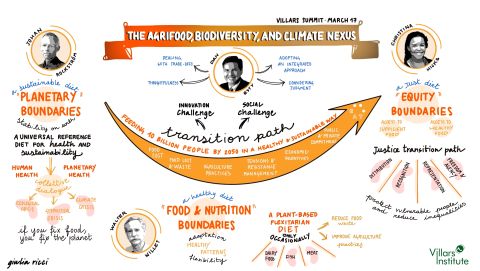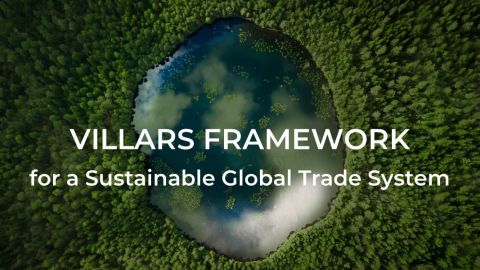Ideas from the Speakers
The closing ceremony of the 2024 Building Bridges Summit emphasized the need for innovative approaches to integrate financing for nature into global climate goals, particularly as the world prepares for the 2025 UN Climate Change Conference (COP 30) in Belém, Brazil.
Storytelling emerged as a powerful tool for fostering a connection with nature. A speaker underscored the importance of personal connections with nature and the need to increase collective awareness. People can connect with nature in unique yet universal ways. For example, Latin America’s “Day of the Dead” ties cultural heritage to natural cycles, reminding us that losing nature means losing culture. These narratives, when shared, inspire wonder and foster a collective purpose. As the world transitions to a new calendar cycle in 2026, integrating Indigenous wisdom and nature-focused practices into systems like policymaking and education can help redefine humanity’s relationship with the planet, creating a future in which culture and nature grow together.
Continuing on the road to Belém, the session shifted to exploring the connections between global systems. The first speaker noted the absence of clear pathways for implementing financing goals and phasing out fossil fuels. This is where transition finance, investments aimed at decarbonizing high-emitting and hard-to-abate industries, plays an important role. In this context, Switzerland leads as one of the world’s lowest carbon intensity economies, measured by emissions per unit of GDP. However, both nationally and globally, significant progress is required. Transparency and collaboration were identified as essential to expanding transition finance and mobilizing the necessary resources.
We need a more integrated approach that connects nature, climate change, and environmental and social sustainability. To achieve this, effective rules and mechanisms to deliver goods, services, and technologies that support this integration are needed. This set the stage for the panel discussion on the pathway to such a future. A speaker noted that each climate Conference of the Parties (COP) has its own story. Three takeaways can be identified from the most recent COP: the use of market mechanisms under the Paris Agreement to drive greater climate ambition; the establishment of finance targets supported by contributions from all countries; and the creation of a task force to mobilize these funds. He also expressed hope that upcoming negotiations will place a stronger emphasis on mitigation. He noted that countries must submit updated nationally determined contributions (NDCs) by February 2025, outlining their emission reduction targets for 2030-2035 in line with the 1.5°C goal. He stressed that COP 30 must review these NDCs to evaluate whether additional measures are required to stay on track.
The second panelist addressed the failure of our current economic system to account for the value of natural systems. To remain within planetary boundaries, systemic change is essential. A key lever for this change is the private sector’s demand for robust policies and regulations that monetize avoided emissions and reward sustainable practices. A second lever lies with the financial sector, which has the power to redirect the $100 trillion global economy towards systems that prioritize nature positivity and circularity. She also proposed integrating “nature on the balance sheet,” a necessary step to ensure that the value of nature is fully recognized within financial systems.
The experts acknowledged that, despite ongoing geopolitical instability, the transformation towards sustainability is underway and unstoppable: 85% of new energy capacity added in 2023 was renewable. Since aligning financial flows is a key objective of the Paris Agreement, there is hope for meaningful progress at COP 30, particularly in areas such as carbon pricing, fossil fuel subsidy reform, and incentives for sustainable investments.
The discussion then moved to the necessity for a just transition that includes voices from across the globe, particularly from the Global South. Systemic change is needed to properly value natural capital and to ensure that Indigenous communities, local farmers, and forest protectors, who safeguard critical ecosystems, are fairly supported and compensated. One speaker proposed revising taxonomies and decision-making frameworks to reflect the fact that transition pathways can differ significantly by region. In this context, COP 30 was highlighted as a vital platform to develop inclusive, people-centered solutions.
Insights from the Audience
The audience expressed support for Switzerland’s potential to take a global leadership role, as a model of direct democracy and given Geneva’s position as a hub for international trade, finance, and diplomacy. This led to a broader question of how Switzerland, particularly its government and financial sector, could capitalize on this position to drive significant investments, potentially in the billions or trillions of dollars, into carbon markets under the emerging framework.
The experts responded by emphasizing the need to establish high-integrity standards and strengthen communication between countries. In this field, the use of advanced, forward-looking technologies, especially negative emission technologies, is essential. Also important is ensuring that all projects uphold environmental integrity alongside social development.
In conclusion, the road to COP 30 is a pivotal opportunity to align global climate action with nature, culture, and equity. As the urgency of the climate crisis intensifies, speakers emphasized the need for systemic change, robust financing mechanisms, and inclusive approaches that honor Indigenous knowledge and support vulnerable communities.








